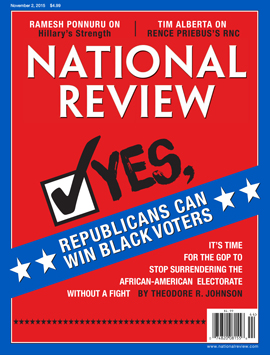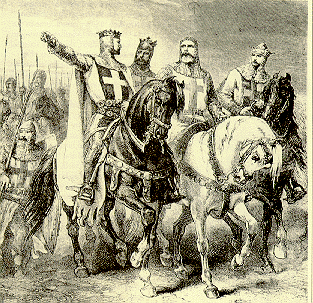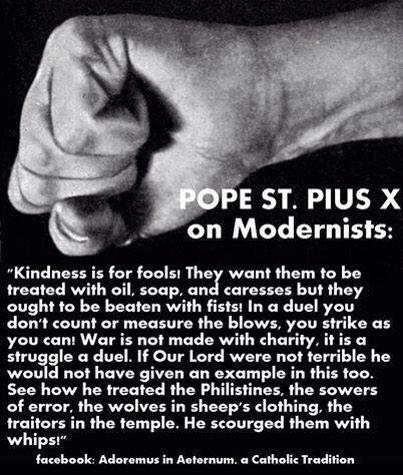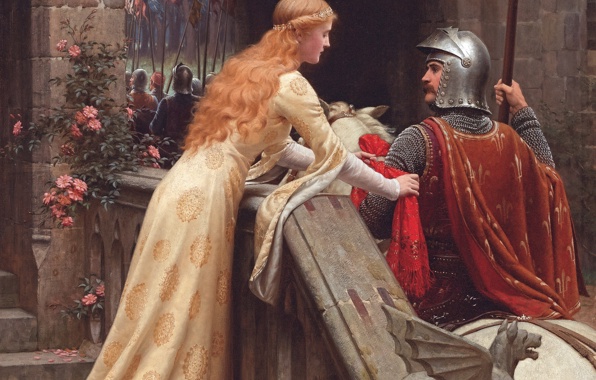It is plain to the unbiased observer that liberal Western societies are in trouble. Low birth rates, unsustainable welfare states, loss of faith, and growing lack of cohesion all point to a reckoning in the not so distant future.
This fact has gotten a lot of people thinking about how we got into such a state in the first place. If we are going to rebuild society, we want to make sure we avoid making that mistake again. We will want to start with a solid foundation.
However, a key piece of the foundation of modern Western culture is Christianity, which raises the question: Did Christianity contribute to the decline? Does Christianity lead to liberalism?
A recent article in the Radix Journal addresses that question. In his piece entitled The Moral Disarmament of the White Race, author Henry Köselitz talks about the need to set up a mythic framework upon which artists can build to communicate “emotional truth” to the masses. The mythic framework that we have today came from Christianity.
But, Köselitz writes, the current mythic framework is what gave us progressivism:
The mythic framework of the West is a product of Christianity. Christianity became the dominant religion in the West when it became the state religion of Rome during 380 A.D, a position which it held until mid 18th century, when it was superseded by liberalism, the current dominant ideology. This did not entail a rejection of Christianity, rather, liberalism evolved from Christianity; fundamentally, it is Christian morality secularized.
Liberalism, according to Köselitz, merely took ideas that were inherent in Christianity and took them to their logical conclusion. He quotes the following passages from Jesus and St. Paul:
The last shall be first, and the first last (Matthew 20:16).
Blessed are the meek: for they shall inherit the earth (Matthew 5:5).
There is neither Jew nor Greek, there is neither slave nor free, there is no male and female, for all are one in Jesus Christ (Galatians 3:28).
For Köselitz, it was only natural that Christianity, which teaches “the brotherhood of man, humility, the centrality of the individual, and holds that the possession of truth is the key to salvation” would lead our current liberal ideology that “advocates a morality of universalism, egalitarianism, and individualism founded upon a claimed devotion to scientific truth.”
One of the problems with this liberal ideology is that it views human beings as solely economic units—culture doesn’t matter. This has led to the unchecked third world immigration that we are seeing today both in the United States and Europe. Thus, “the cultural, political, and religious elites in the West support policies that lead to the destruction of their nations, communities, and race.”
The implication of the article is that if we are going to rebuild society, we need to start with a different religion that will provide a healthier mythic framework. This healthier framework:
[C]elebrates elitism rather than equality, which is particular to Europeans rather than universalist, which provides a place and meaning for the individual within the community, rather than conceiving of man as a social atom, and is self affirmative rather masochistic.
This is why “conservatives” are always against the ropes, especially when it comes to racial identity. You can see it in the way they are able to affirm that “black pride” is good, but they categorically reject “white pride.” You can see it in their complete inability to reject the idea that millions of Muslim immigrants are not a good fit with European society.

These “conservatives” reject the liberalism of today and try to replace it with the classical liberalism of the past, but classical liberalism is part of the same defective mythic framework that gave birth to the modern world. Because of this, simply “returning to the Constitution” or embracing libertarianism will never be able to counteract the corrosive effects of modern liberalism.
I think that Köselitz is correct in his diagnosis. Liberalism, whether it exists in its current form or in its older, classical form is a defective philosophy. He is also correct that Christianity provided the soil from which this philosophy sprang. The real question, though, is did liberalism come from a healthy Christianity, or a compromised form?
Healthy Christianity

To learn the teachings of Christianity, it is not sufficient to simply read the Bible. The Bible has always been part of the Christian community, and it is necessary to observe how the teachings of the Bible were understood and lived by that community—the Catholic Church.
The civilization that organically grew from Catholic teaching is diametrically opposed to our modern liberal culture. Whereas modern society is egalitarian, feminist, and democratic, traditional Catholic cultures were hierarchical, patriarchal, and monarchical.
When Catholic society was in full bloom, society was divided into three primary layers: those who pray (priests), those who fight (nobles), and those who work (peasants). Each group had its particular role to play. The rulers, who were part of the nobility, were not parasites on the people they ruled, they served a fatherly function of protecting their people.
The Catholic society of the Middle Ages was not pacifist. It was the age when the Germanic pagan warrior traditions were united to Christian teaching to create chivalry. The history of the Crusades testifies to the fact that when these Christian knights were united under good leadership, they ranked among the best fighting forces of history.
If a fleet of boats carrying thousands of Muslim men had landed upon the shores of Medieval Europe, it is very unlikely that they would have been greeted with four star accommodations, a comfortable salary for two years, and a generous dental plan. Instead, they probably would have been viewed as an invading force and slaughtered soon after they disembarked.
But what about the passages that Köselitz quoted? Don’t they prove that Christianity is hopelessly egalitarian and weak?
The passage from Galatians where Paul says, “all are one in Jesus Christ” does not mean that people are equal in every way. If it did, all of Catholic society was in flagrant violation of this verse. In context, Paul is saying that God does not play favorites. God does not favor Jewish Christians over Gentile Christians. In God’s eyes, they are equal. It doesn’t imply that democracy is better than monarchy, that there is no such thing as an aristocracy, or that women can be priests.
This verse also doesn’t imply that all cultures or races will eventually be obliterated into a multicultural mush, rather, as the Catholic monk Cui Pertinebit points out in the comments to the article, Paul is “warning the Christians in Galatia NOT to give up their ethnic identity to embrace Jewish identity and customs.”
The Church has always recognized that cultural, racial, and gender differences as good things. Even the ideal of chivalry is testimony to this fact. The Church did not obliterate the Germanic pagan warrior traditions, rather it preserved and elevated these traditions to an even greater honor.
Similarly, the passages on humility do not mean that a Christian must also be a “cuckservative” who allows his own family, culture, and race to be destroyed in deference to others. True humility is simply the recognition of where we stand in relation to God. It does not preclude us from acting decisively and ferociously when the situation demands. What C.S. Lewis says this about the ideal knight sheds light on this paradox of humility:
The knight is a man of blood and iron, a man familiar with the sight of smashed faces and the ragged stumps of lopped-off limbs; he is also a demure, almost a maidenlike, guest in the hall, a gentle, modest, unobtrusive man. He is not a compromise or a happy mean between ferocity and meekness; he is fierce to the nth and meek to the nth.
Where does liberalism come from?

G.K. Chesterton noted that all heresies have their origin in either a perversion of authentic Christian teaching or in an overemphasis on a single point of Christian teaching to the exclusion of the others. For example, the Quaker’s pacifism results from an overemphasis on the Catholic virtue of gentleness.
Liberalism is the result of a similar process. The liberal takes the Christian doctrine of equality before God and perverts it to mean that all people are literally equal—an idea that is obviously incorrect.
Ultimately, then, liberalism is a modern heresy that needs to be stamped out. However, it is not a necessary heresy. There is nothing in Christianity that inexorably impels it toward liberalism. If it did, we would have expected to see liberalism earlier in Christianity’s history, but it only begins to show up in the late 18th century.
Conclusion

It is true that the mythic framework of modern society is highly defective and needs to be replaced if we are to rebuild civilization. But the answer is not a return to a European paganism that only exists as a scholarly reconstruction based on ancient Christian documents. Instead, we must return to our authentic Catholic foundation. The sooner we get to work on that, the sooner we can begin to rebuild the ruins of our civilization.
Michael – this is a great post I have read it now four times and I have come to the conclusion – the only way I can see Christianity help lead to liberalism is through charity and perhaps guilt of having more than one needs. In charity it is possible to give too much – to the point that those receiving (or taking) lose the motivation and/or ambition to do for themselves – but Christianity preaches charity, Christianity is charity. But can the charity be too much, to the point where a giving society have taken away not only the need to rise above your station it has also done away with individual responsibility? I believe in helping the needy but I want to see them make an effort to help themselves – I had always been told that God helps those that help themselves – a quote that is not in the Bible… but is it true? Yes. God will provide the opportunity and the moment – it is up to us to take advantage of it. Charity and helping those in need is, of course, the right thing, but can we go too far – I think we have and now we have to fix that problem… but this post is much to contemplate and I will think on it some more but I wanted to get these thoughts down before they slip away… oh… and nowhere have I ever read anything to make me believe that God is democratic…
@Victor, Yes, it is a perversion of charity. St. Paul writes in 2 Thess. 3:10 “For also when we were with you, this we declared to you: that, if any man will not work, neither let him eat.” But modern liberals (including priests and bishops) will insist that we must feed, clothe, and house people who do not work.
When some men reject Christianity because they think it is too weak or too charitable, they are rejecting a heresy, not Christianity.
I often read articles like those of Köselitz and am a little amused because in terms of the Occident they are entirely Western-centric. There is little to no mention of the eastern half of the Occident. We had no reformation. We had no ‘Enlightenment’ to speak of among the Slavic Orthodox peoples. Our ‘Enlightenment’ was a German import carried by Vladimir Lenin and used at an unfortunately critical juncture when a profoundly Modernist war ravaged the population under an ineffectual period of leadership.
Even today, in spite of almost a century of Communism, Eastern Europe remains fundamentally illiberal. I think this is perhaps part ethnic and part religious, after all, the Catholic Poles have also remained fundamentally illiberal, in fact it could be argued they are more Catholic than the population of the Vatican itself.
I’m not sure what it is about Orthodoxy in countries like Russia and Serbia, perhaps it’s mysticism and disdain for ‘reasoning’ which hinder ideas like social justice, progress, etc. and reserve better things for the next life. It does appear however that leftism has to constantly be imported into the east, violently or subversively. It is rarely homegrown.
You’ve hit on a very annoying point for me. The whole Catholic hierarchy seems to ignore the Orthodox. I know that there have been some high level meetings, and some gestures, but it doesn’t seem to be as high a priority as it should be. A lot of energy was spent in trying to reconcile with the various Protestant churches, which are quite far from Rome, but less energy spent on the Orthodox, who are quite close. Rome’s current course will take it even farther astray.
Guenon said that we should look to India for traditional civilization. Perhaps we don’t need to look that far East.
I am curious to learn more about how Orthodoxy prevents the sort of universalist nonsense that afflicts even solid Catholics. Any recommendations on where to start?
I’m but a novice when it comes to Orthodox theology, having been familialy disenfranchised in terms of faith for the first 18 years of my life. But I was recently reading about one of the big sticking points that divides Orthodox and Catholics, which is the Filioque clause of the Niceno-Constantinopolitan Creed. A later addition was made by Rome to read that the Holy Spirit (that part of God which we are most intimate with) proceeds from the father AND THE SON. Orthodox do not believe it proceeds from the Son, but only from the Father, thus not having connection to the ‘Logos’. This is why Orthodoxy has been steeped in mysticism throughout its history because there has been an appeal to that which is ‘superrational’ (not rational to human beings) with regard to how we experience God.
Bavinck (no fan of the Orthodox position) was rather fair in stating
“The Father is the fountain and origin of the Godhead. Accordingly, if the Spirit also proceeds from the Son, the Son is coordinate with the Father, the principle of unity is broken, and a kind of ditheism results. For the Eastern church the unity of the divine essence and the Trinity of persons does not arise from the divine nature as such but from the person of the Father. He is the sole originating principle. The three persons, according to the Orthodox, are not three relations within the one being, not the self-unfolding of the Godhead; rather, it is the Father who communicates himself to the Son and the Spirit. From this it follows, however, that now the Son and the Spirit are coordinated: they both have their originating principle in the Father. The Father reveals himself in both: the Son imparts the knowledge of God, the Spirit the enjoyment of God. The Son does not reveal the Father in and through the Son. The two are more or less independent of each other: they both open their own way to the Father. Thus orthodoxy and mysticism, the intellect and the will, exist dualistically side by side. And this unique relation between orthodoxy and mysticism is the hallmark of Greek piety. Doctrine and life are separate. Doctrine is for the intellect; it is a suitable object for theological speculation. Alongside it there is another fountain of life: the mysticism of the Spirit. This mysticism does not arise from knowledge but has its own source and nourishes the human heart. The head and the heart are not rightly aligned and related. Ideas and emotions are separate. The ethical linkage that should unite the two is lacking.”
So we might say that in Roman Catholicism, the Holy Spirit and doctrinal reason/argumentation/etc. are bound up together, in Orthodoxy they are split and the Holy Spirit, while not overriding dogma, will override reason if it has to, because our own logic can deceive us and lead us into atheism, liberalism, apostasy, etc. In This regard, the east seems less foundationally vulnerable to the arguments of liberalism. Now, they absolutely can be corrupted and bribed, but it is very hard to make true liberals out of them. and I would guess that this spiritual legacy of Orthodoxy has something to do with it.
Gornahoor is a very good blog to follow for some avant-garde Mystical Traditionalism and esoterics. It introduced me to a lot of this stuff.
http://www.gornahoor.net
Thank you for this! Wonderfully written.